Shoppers who care about product quality and American manufacturing often look for tools made in the USA. USA-made tools offer a unique combination of reliable craftsmanship, strict manufacturing standards, and clear country-of-origin labeling. This helps buyers make informed choices when building a reliable toolkit for professional or personal use.
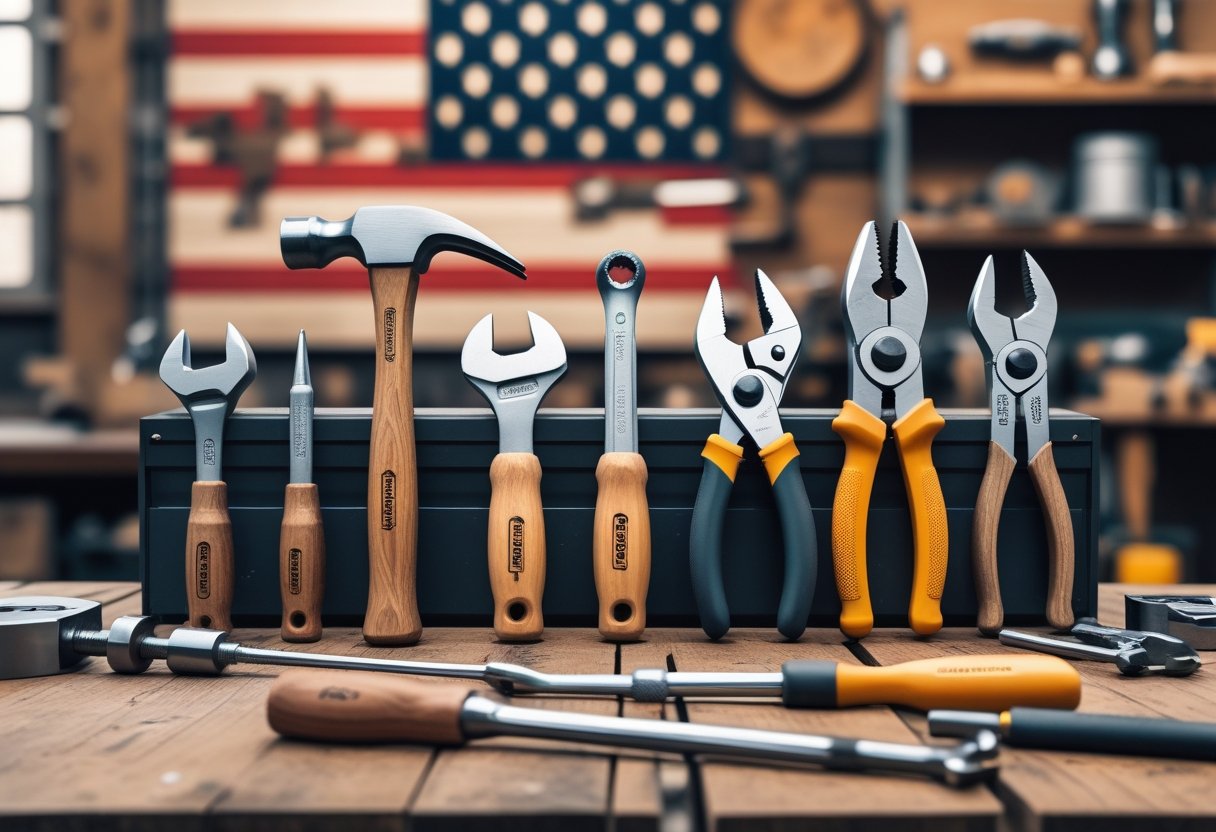
There are many categories of American-made tools, from hand tools to power tools and specialty equipment. Leading domestic brands are known for their durability and customer trust, though buyers should pay attention to authenticity labels and manufacturing details.
Key Takeaways
- Made in the USA tools are valued for quality and manufacturing transparency.
- Buyers should check labels and learn about top American tool brands.
- US tool makers face industry challenges but remain industry leaders.
What Defines Made in the USA Tools
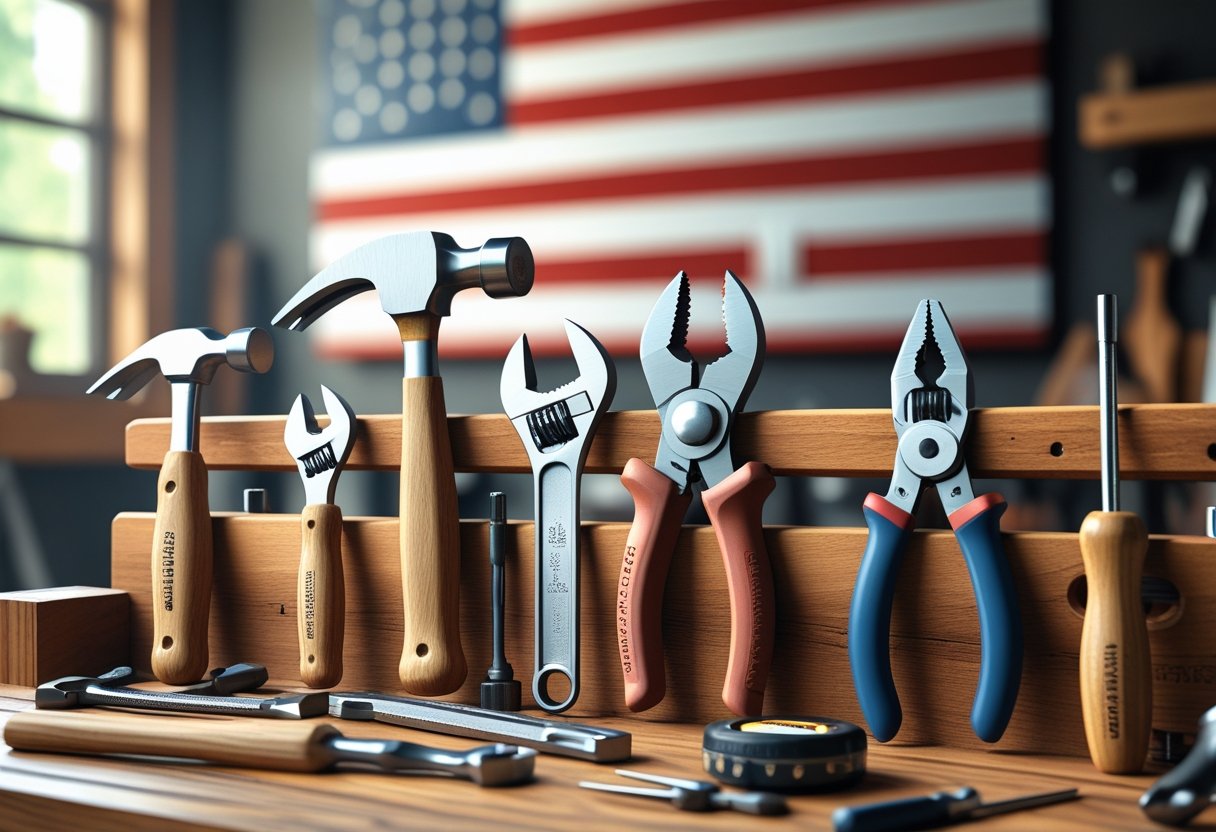
Not all tools labeled as “Made in the USA” meet the same requirements. Understanding the legal definitions, certifications, labeling standards, and how manufacturing processes are structured is essential for both consumers and manufacturers.
Legal Criteria and Standards
The Federal Trade Commission (FTC) regulates the use of “Made in USA” claims. For a tool to qualify, the FTC requires that “all or virtually all” of the product be made in the United States. This means that:
- All significant parts and processing must come from the U.S.
- Only negligible, insignificant foreign content is allowed.
The term applies not only to the final assembly but also to the sourcing of raw materials and components. However, if certain components are unavailable domestically, the FTC may allow some flexibility. Manufacturers must ensure compliance, as misleading claims can result in legal action and fines.
Certifications and Labeling
Various certifications and labels help customers verify whether a tool is genuinely made in the USA. The “Made in USA” label by the FTC is the most recognized, but there are also union-made and veteran-made designations.
- Self-certification is common, but it carries the risk of regulatory review.
- Some independent organizations audit manufacturers for compliance, adding greater credibility.
- Proper labeling must be clear, prominent, and not misleading.
Table: Common Labels and Their Criteria
| Label Type | Main Requirement |
|---|---|
| Made in USA | All or virtually all U.S. origin |
| Assembled in the USA | Last substantial assembly in the U.S. |
| Union Made | Produced by union labor |
| Veteran Made | Produced by U.S. veterans |
Manufacturing Processes
The location and nature of manufacturing play a central role in whether a tool can carry the “Made in USA” label. Most qualifying tools are:
- Assembled, finished, and tested in American facilities.
- Made from domestically sourced metals, plastics, and other materials when possible.
Companies often use vertically integrated manufacturing to maintain tighter control over sourcing and quality. Some manufacturing steps, like raw material extraction or specialty coatings, may involve imported inputs if supported by documentation and compliance.
Detailed process logs and traceability are typically required to prove that the finished product meets all necessary criteria. This documentation is vital if the FTC or third-party auditors conduct an inspection.
Benefits of Choosing American-Made Tools
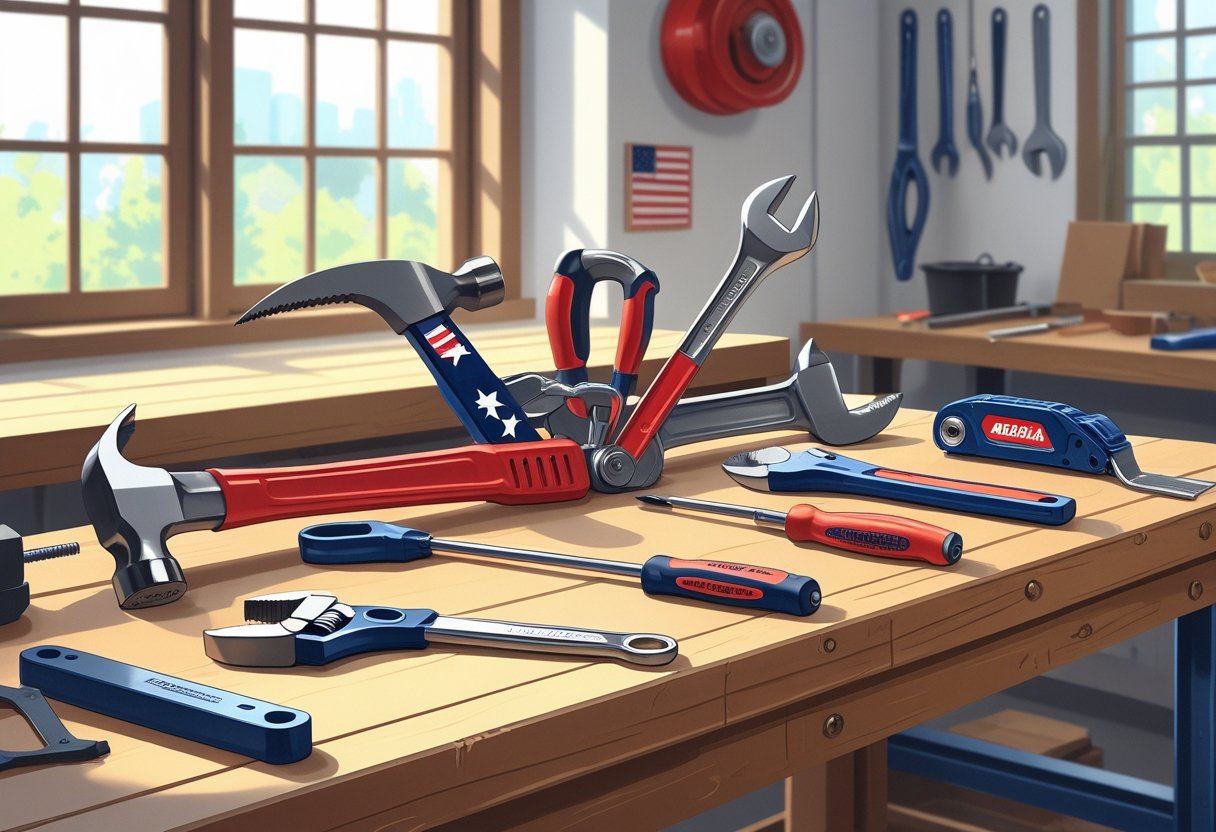
Selecting tools manufactured in the United States provides straightforward advantages, directly tied to product workmanship, economic effects, and business practices. Focusing on locally produced tools often impacts reliability, employment, and assurance in purchase decisions.
Quality and Durability
American-made tools are recognized for strict quality control. Manufacturers follow clear national standards, and many production facilities conduct frequent inspections. This focus leads to products that perform consistently and last longer.
Materials sourced by U.S. companies tend to undergo greater scrutiny before use. Metals, alloys, and plastics often meet precise grading that helps ensure tools resist breakage under stress.
Many brands offer multi-year or even lifetime warranties as a sign of confidence in their build quality. With U.S.-produced tools, it is common to find solid metal construction instead of lower-cost substitutes or lightweight composites.
In summary:
| Feature | U.S.-Made Tools | Mass Import Alternatives |
|---|---|---|
| Durability | High | Varies |
| Inspections | Frequent | Inconsistent |
| Warranty | Often Lifetime | Limited |
Supporting Local Economies
Purchasing American-made tools directly supports employment and growth across U.S. communities. Local toolmakers provide jobs in manufacturing, logistics, management, and distribution, which support families and regional tax bases.
By purchasing domestic tools, consumers contribute to jobs that pay fairer wages and help to fund community infrastructure. Locally owned retailers and distributors also benefit through more stable business relationships.
Key impacts:
- Retention of profits within the region
- Reduced reliance on overseas manufacturing cycles
- Increased demand for state-based research and development
These effects form a feedback loop, boosting industries tied to raw materials, packaging, and transportation as well.
Workforce and Labor Practices
U.S. manufacturers operate under employment laws covering workplace safety, minimum wage, and employee rights. Factory workers producing American-made tools receive protections and benefits not always guaranteed in global supply chains.
Domestic toolmaking companies are typically inspected by OSHA and subject to state labor requirements. This encourages safer work environments and prohibits exploitative practices such as child labor or excessive overtime.
Transparent hiring and compensation practices are enforced through regular audits, enabling buyers to support ethical business operations. Many consumers value knowing that their purchases do not come at the expense of basic employee rights.
Supply Chain Transparency
American tool brands generally offer greater supply chain visibility, making it easier for buyers to verify origin and quality. Most include detailed information about where each product component is manufactured and assembled.
Being subject to U.S. regulations means that American companies are required to keep accurate and accessible records. This transparency helps customers resolve warranty claims and track product recalls when necessary.
Includes:
- Clear product labeling
- Accessible company contact information
- Regulatory compliance with FCC, EPA, and state laws
A transparent supply chain also lets buyers support companies that align with their own environmental or ethical values.
Popular Categories of Made in the USA Tools
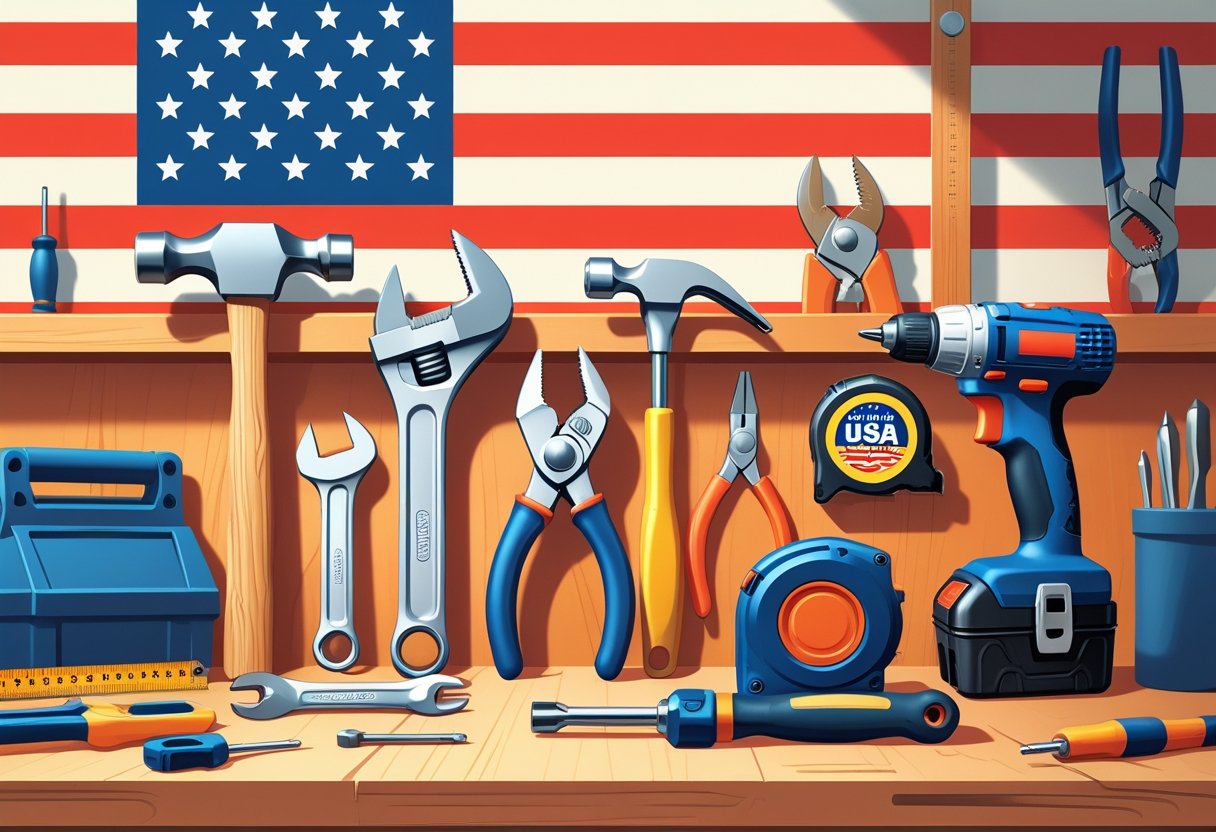
Manufacturers across the United States produce a diverse range of tools, with areas of specialization that emphasize durability, reliability, and precise craftsmanship. Key categories include traditional hand tools, robust power tools, and finely calibrated precision instruments used in advanced industries.
Hand Tools
Hand tools made in the USA are known for their quality steel and ergonomic designs. Brands like Klein Tools, Channellock, and Estwing deliver hammers, pliers, wrenches, and screwdrivers built for both professional and home use. The focus is on longevity—the materials and manufacturing processes prioritize toughness against wear and corrosion.
Many American-made hand tools carry lifetime warranties, reflecting the confidence in their construction. Features such as slip-resistant grips, laser-etched markings, and heat-treated finishes are common. In trade environments, such as electrical or automotive work, users value hand tools made domestically for their reliability and easy access to replacement parts.
American companies still use traditional forging and machining techniques, ensuring strict quality control standards. Some brands even maintain small-batch or hand-inspected production lines.
Power Tools
Power tools manufactured in the United States are favored for their industrial-grade motors, safety features, and repairability. Companies like Milwaukee Tool, DeWalt (select products), and Malco design equipment for heavy-duty applications, including drills, saws, and impact drivers.
Key selling points include powerful torque ratings, longer battery life for cordless models, and robust housings. Many models feature brushless motors for improved efficiency and reduced maintenance. The “Made in USA” label often means easier service and access to domestic parts.
Table: Popular Made in USA Power Tools
| Tool Type Notable Brand Application | on | |
|---|---|---|
| Drill/Driver | Milwaukee Tool | Wood, Metal, Masonry |
| Recip. Saw | DeWalt | Demolition |
| Metal Shears | Malco | HVAC, Sheet Metal |
Buyers often choose American-made power tools for jobsite durability and dependable support.
Precision Instruments
Precision instruments from the USA, such as micrometers, calipers, and dial indicators, are trusted in manufacturing, machining, and scientific fields. Companies like Starrett and Mitutoyo (US-made lines) focus on tight tolerances and exceptionally accurate measurements.
The standout quality here is measurement reliability. Even in demanding environments, these instruments maintain their accuracy over long periods. Features include laser-engraved graduations, hardened measuring faces, and resistance to environmental factors like oil and dust.
Some precision tools are supplied with NIST-traceable calibration certificates. Lab technicians and machinists benefit from knowing their equipment meets stringent quality requirements. Replacement parts and calibrations are also readily managed through US-based service centers.
Leading American Tool Brands
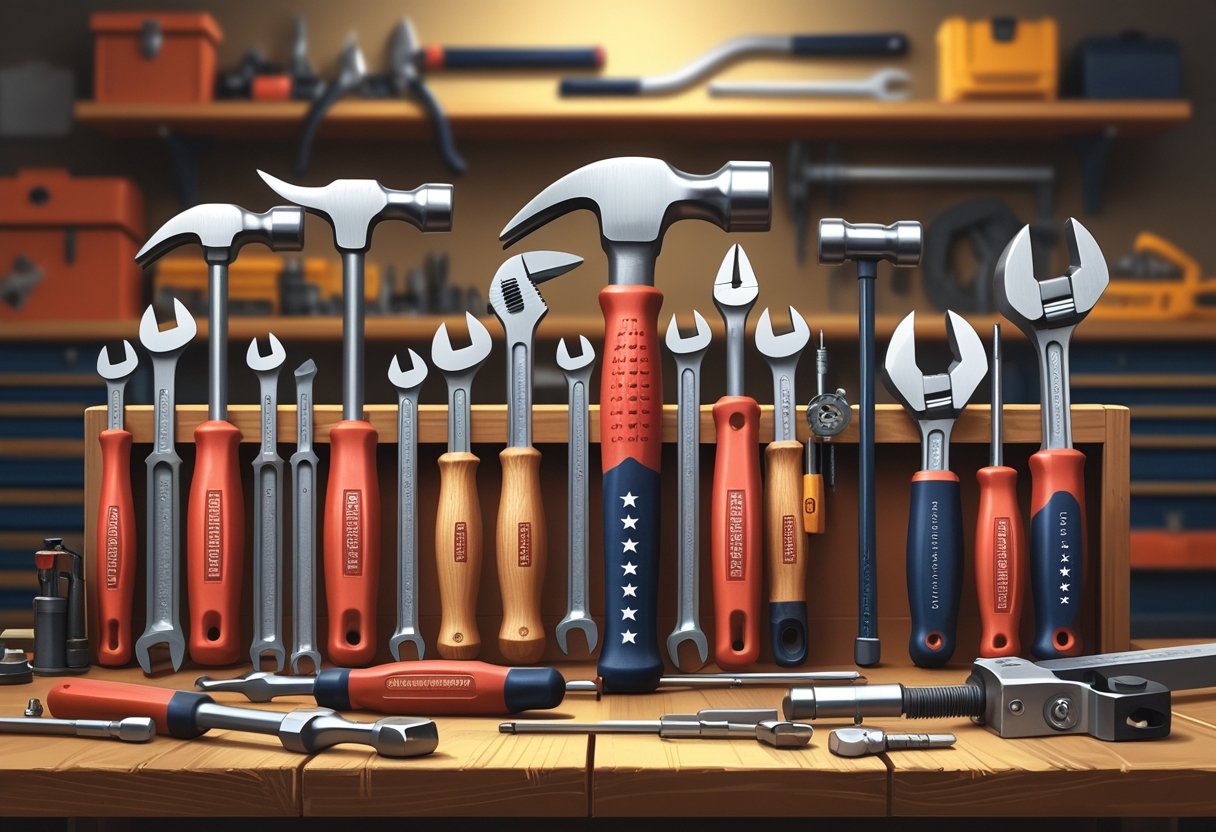
American toolmaking includes legacy companies that trace back over a century, along with fast-growing innovators and niche operations serving local regions. Many brands still maintain U.S.-based production and uphold strict standards that appeal to both professionals and hobbyists.
Historic Manufacturers
Historic American manufacturers are recognized for their longevity and reputation for reliability. Estwing, founded in 1923, is known for hammers and striking tools produced in Rockford, Illinois. Snap-on provides professional mechanics with hand tools and diagnostics, manufacturing many of its sockets and wrenches at U.S. facilities since 1920.
Klein Tools, established in 1857, remains a staple for electricians, producing pliers and screwdrivers in Illinois and Texas. Many of these manufacturers focus on high-quality metals and precise craftsmanship, contributing to longstanding client trust.
The table below highlights core products and locations:
| Manufacturer, Notable Products, U.S. | S. Production Site | |
|---|---|---|
| Estwing | Hammers, Axes | Rockford, IL |
| Snap-on | Sockets, Wrenches | Kenosha, WI |
| Klein Tools | Pliers, Screwdrivers | Mansfield, TX; Lincolnshire, IL |
Innovative New Companies
Recent decades have seen the rise of innovators who blend traditional U.S. manufacturing with advanced technologies. Knipex USA and Bondhus produce precision hand tools with material innovations. Many new brands invest in robotics, quality control, and ergonomic design. Companies such as Milwaukee Tool reinvest in advanced assembly lines in Mississippi and Wisconsin, resulting in job growth and new patents.
These brands often market directly online, reaching a national audience. Product development often relies on user feedback, leading to continuous improvements in form and function.
Regional Tool Makers
Smaller toolmakers play a significant role in American manufacturing, serving local industries and craftspeople. Grace USA, based in Minnesota, specializes in gunsmithing tools and woodworking equipment made in small batches.
Wright Tool in Ohio produces hand tools for industrial and energy sectors, emphasizing durability and regional support. Some brands, like Council Tool in North Carolina, serve forestry and emergency services with axes and specialty tools.
Regional makers may operate a single factory or a small network, allowing for quick adaptation to customer needs. Their focus is often on service, custom orders, and specialty items not available from large-scale manufacturers.